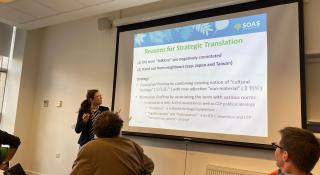
Breadcrumbs navigation
Why formal inclusion is not enough in global governance
Jack Taggart and Sebastian Haug discuss the key points from their new Review of International Studies (RIS) article. If you'd like to know more you can read the full article at - De jure and de facto inclusivity in global governance.
Global governance has long been dominated by states. In bodies like the United Nations (UN) or the Organisation for Economic Cooperation and Development (OECD), state representatives come together to deliberate and take decisions about global concerns. Non-state actors have, if at all, a consultative function in these inter-governmental settings: they may be asked to provide their perspective on matters at hand but have been traditionally excluded from decision-making processes.
The last two decades, however, have seen as rise of more inclusive governance arrangements. Through multi-stakeholder participatory arrangements, various international organisations have joined hands with different state and non-state actors – from national and subnational governments to private sector companies, foundations and civil society organizations – to create mechanisms where a wide range of actor groups are formally included in deliberation and decision-making procedures.
Existing studies have analysed the rise in numbers of these more inclusive partnerships, and have underlined their potential to provide more effective and legitimate governance. The quality of inclusion in these partnerships, however, has not been systematically assessed. While some authors have highlighted that formal provisions to include non-state actors are not enough to ensure their ability to actually participate, there is no framework to systematically assess to what extent the inclusion of non-state actors on paper reflects their inclusion in practice.
In a recently published article in the Review of International Studies, we address this gap and present a conceptual framework for examining not only the de jure (formal) inclusion of non-state actors in global governance initiatives but also the degree of their de facto (actual) inclusion. We outline that the legitimacy of stakeholders does not only depend on the formal definitions of actor categories but also on whether all stakeholders recognize each other as legitimate participants. If a civil society representative has a formal seat at the table, for instance, but nobody speaks or listens to them, inclusion is severely hampered. The same goes for the ways that stakeholders engage in decision-making processes. The institutionalization of formal structures for stakeholder engagement can help make sure that civil society representatives are kept informed or can vote in meetings, but this requires their willingness and – importantly – capacity to engage. If the global governance institution in question is seen as unwelcoming or impenetrable, weaker actors might fail to engage meaningfully despite the existence of formal structures that are supposed to ensure their inclusion.
In our paper, we apply this de jure/de facto heuristic to the analysis of a multi-stakeholder development partnership that some have hailed as uniquely inclusive: the Global Partnership for Effective Development Cooperation (GPEDC). Supported by both the UN and the OECD, the GPEDC was set up in 2011 to respond to criticism that traditional donors were dominating global debates about development effectiveness. Officially, the GPEDC recognizes a wide array of stakeholder groups as legitimate participants, and non-state actors are represented at the highest levels of GPEDC governance structures. In practice, however, and for different reasons, a group of traditional donor countries continue to directly and indirectly dominate the partnership. Through a review of public and internal documents, participant observations and about 100 interviews with representatives from all stakeholder categories, we show how unequal power structures and tensions between actor groups can undermine what on paper looks like a uniquely inclusive global governance initiative. Insights from participants themselves, particularly those with less resources, show that traditional donor countries dominate the GPEDC through sustained institutional capacity, and that civil society organisations feel challenged through the mistrust of developing country governments and the emphasis on private sector concerns.
When approached through our framework, the case of the GPEDC suggests that de jure provisions are not enough to ensure meaningful inclusion. Adding official actor categories and institutionalizing engagement mechanisms can be a – sometimes important – step for making sure that non-state voices get a say alongside states, but not necessarily so. What matters more are de facto dynamics beyond formal provisions that are often shaped by power differentials: irrespective of official stakeholder definitions, do all actors actually recognize each other as legitimate participants in governance processes? Do all actors perceive the global governance institution in question as sufficiently relevant to engage on a sustained basis? Maybe even more importantly, do all actor groups have the means to participate regularly, and on par with other – potentially more powerful – participants?
These are questions that should be asked when assessing the inclusivity of global governance institutions. Counting the number of multi-stakeholder partnerships across different fields of global governance is a certainly worthwhile undertaking; but if we want to know more about the quality of inclusion we should dig deeper. Our distinction between de jure and de facto inclusion, together with a focus on the legitimacy of stakeholders and their forms of engagement, provides a conceptual tool for guiding such analysis. Considering trends to “include” anyone and everyone – not only in global governance but also in the workplace or the classroom – we should keep in mind that realising meaningful inclusion can be a complex matter. And that instead of focusing on formal inclusivity we should also engage with the actual experiences and perspectives of those who are supposed to be included.
Want to know more? You can read the full article at DOI: https://doi.org/10.1017/S0260210524000627
This particualr article is open access, however BISA members receive access to RIS (and to our other journal European Journal of International Security) as a benefit of membership. To gain access, log in to your BISA account and scroll down to the 'Membership benefits' section. If you're not yet a member join today.
Image from Eric Prouzet on Unsplash


